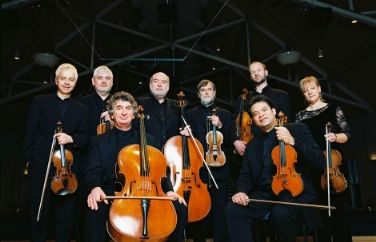|
Symphony
FROM THE NEW WORLD TO THE OLD WORLD
by Peter Lert
Saturday, June 14, 2025
Chamber
MC2 DUO RECITAL CLOSES 222'S SEASON
by Terry McNeill
Saturday, June 14, 2025
Choral and Vocal
CANTIAMO SONOMA'S LUSCIOUS A CAPELLA SINGING IN SEASON ENDING CONCERT
by Pamela Hicks Gailey
Sunday, June 8, 2025
Symphony
SRS SEASON ENDS WITH RESOUNDING TA-TA-TA-BANG
by Terry McNeill
Sunday, June 1, 2025
Symphony
YOUTHFUL VIRTUOSITY ON DISPLAY AT USO'S MAY CONCERTS
by Peter Lert
Saturday, May 17, 2025
Symphony
MYSTICAL PLANETS AND LIVELY GERSHWIN ORTIZ AT FINAL SRS CONCERT
by Peter Lert
Sunday, May 4, 2025
Symphony
VSO'S CONCERT MUSIC OF TIME, MUSIC OF PLACE
by Peter Lert
Sunday, April 27, 2025
VOCAL ELEGANCE AND FIRE AT THE 222'S RECITAL APRIL 26
by Pamela Hicks Gailey
Saturday, April 26, 2025
CANTIAMO SONOMA SINGS AN INSPIRED GOOD FRIDAY MOZART REQUIEM CONCERT
by Pamela Hicks Gailey
Friday, April 18, 2025
DRAMATIC SHOSTAKOVICH SYMPHONY CLOSES PHILHARMONIC'S 25TH SEASON
by Terry McNeill
Sunday, April 13, 2025
|
 |
 Academy St. Martin In the Fields Chamber Ensemble |
EMSEMBLE PERFECTION IN ST. MARTIN ACADEMY WEILL CONCERT
by Terry McNeill
Saturday, October 24, 2015
With the social and musical glamour surrounding the recent Lang Lang and Joshua Bell recitals in Weill, the Academy of St. Martin in the Field’s eight-musician chamber ensemble's Oct. 24 concert came as a calming musical breeze.
Known to lovers of fine orchestral playing through their scores of recordings, the Academy from London made their local debut with three works that spotlighted refinement and taste rather than high drama. What better way to begin a showcase of distinctive string playing that Rossini’s Sonata in sunny G Major? I have heard the work, purported to have been written at age 12, performed with forces larger than the quartet heard here. But it worked splendidly, the tempos throughout not fast and the lean sound convincing. In the Andantino the final three chords from four instruments were delicately in sync.
The lively concluding Allegro was deftly played with the low sonorities from double bass player Linda Houghton and cellist Stephen Orton carrying well in Weill.
Another small ensemble, this time a quintet playing Mozart’s E-Flat Major work for horn and strings (K. 407), closed the short first half. There is a lot of elegant soft playing in the 1784 work, but with contrasting and often dominating horn playing from Stephen Stirling. The first movement and much of the additional two are almost a concerto for horn, with standout playing of melodious sweetness in the Andante by solo violinist Tomo Keller and duo violists Robert Smissen and Harvey De Souza. The bell of the horn faced to the gallery at the back of the stage but the adroit Mozart sound wasn’t adversely affected.
The finale featured assertive phrasing with horn and violin in dance character, with impeccable phrasing and ensemble.
A short first half turned after intermission to a long but heavenly Schubert Octet (D. 803). The sonic addition of clarinetist Timothy Orpen was welcome after so much luxuriant string playing, and the six movements unfolded with inexorable care and chaste voicing. The unison playing throughout was exemplary and Mr. Keller and De Souza were ever energetic, with the former exhibiting a coiled and then uncoiled ballet with his body and bow.
In the Adagio the clarinet’s lovely opening theme passed over to the violin, and in a duo soared in a Mozartian manner, supported by the horn and bassoon. In this movement there was a richly striking double bass solo over pizzicatos in the higher strings. Perfection.
Much of the Octet has small dance sections with often “question and answer” refrains (the scherzo-like movement 3 and the Andante variations) and the Academy seemingly caught every nuance. Some Octet themes appear initially banal but the composer develops them with mastery, and the performer’s artistry produced a consummate whole. The slight menace of the Menuetto and the controlled power of the finale (Andante Molto), a happy march, were compelling Schubert playing. Polished playing abounded, even in the difficult and constant changes in volume and rhythm.
The sensuous and noble performance produced the only standing ovation of the evening from the surprisingly large audience of 800. Why surprising? With no star soloists or blockbuster repertoire the Academy was able to draw a big house solely from it sterling reputation and enchanting playing.
|

